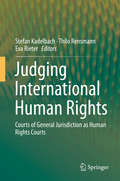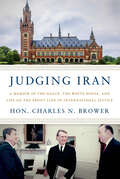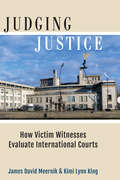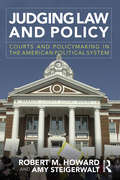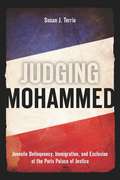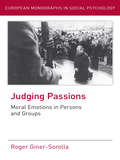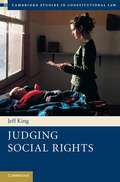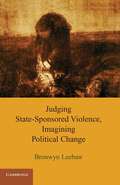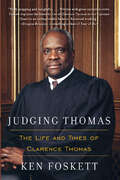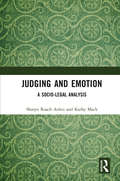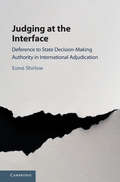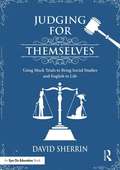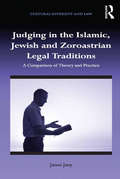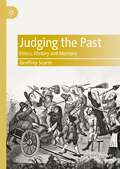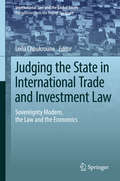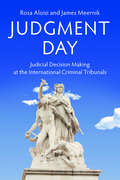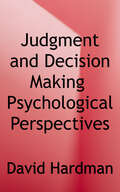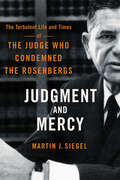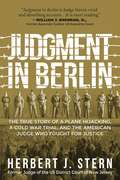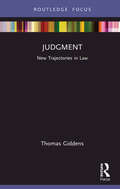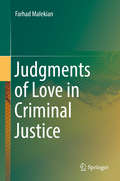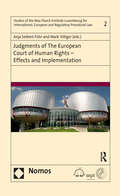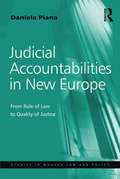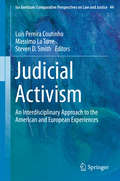- Table View
- List View
Judging International Human Rights: Courts Of General Jurisdiction As Human Rights Courts
by Thilo Rensmann Stefan Kadelbach Eva RieterThis book attempts to establish how courts of general jurisdiction differ from specialized human rights courts in their approach to the implementation and development of international human rights. Why do courts of general jurisdiction face particular problems in relation to the application of international human rights law and why, in other cases, are they better placed than specialized human rights courts to act as guardians of international human rights? <P><P>At the international level, this volume focusses on the International Court of Justice and courts of regional economic integration organizations in Europe, Latin America and Africa. With regard to the judicial implementation of international human rights and human rights decisions at the domestic level, the contributions analyze the requirements set by human rights treaties and offer a series of country studies on the practice of domestic courts in Europe, the Americas, Africa and Asia. This book follows up on research undertaken by the International Human Rights Law Committee of the International Law Association. It includes the final Committee report as well as contributions by committee members and external experts.
Judging Iran: A Memoir of The Hague, The White House, and Life on the Front Line of International Justice
by Hon. Charles N. BrowerFrom a divided Berlin to The Hague, the Reagan White House, the forests of Costa Rica, and more, Judge Charles N. Brower shares a personal history of a life spent at the forefront of international justice— and a case for the role of law in preserving global peace.A judge of the Iran– United States Claims Tribunal for four decades, Charles N. Brower is aninternationally recognized leader in arbitration and has handled cases on six continents. With quick wit and a keen eye for adventure, he takes readers on a tour of his extraordinary career.As a young lawyer fresh from Harvard, Brower quickly made partner at a Wall Streetfirm. After just four months, however, he left the expected path to join the U.S. State Department, embarking on a career that put him in the thick of Cold War Europe and led to a lifelong focus on international law.Brower' s drive carried him to the heart of pressing issues, including globalization, governmental ethics, environmentalism, and human rights. At each stop, Brower encountered criminals and victims, advocates and miscreants, especially at the Iran– United States Claims Tribunal, where heated disagreements between judges once erupted into physical violence. His work at The Hague was interrupted only by his time as an advisor to President Ronald Reagan at the height of the Iran– Contra scandal, and Brower eventually became the most-appointed American judge ad hoc of the International Court of Justice.Judging Iran is a frank insider account of the highest echelons of international law. As an active judge to this day, Brower offers a nuanced history of modern arbitration between nations, from our earliest concept of international law to today' s efforts for justice. And, as a global citizen, he argues that the law is essential in our work for peace.
Judging Justice: How Victim Witnesses Evaluate International Courts
by James D Meernik Kimi L KingSome injustices are so massive, so heinous, and so extraordinary that ordinary courts are no longer adequate. The creation of international courts and tribunals to confront major violations of human rights sought to bring justice to affected communities as well as to the entire world. Yet if justice is a righting of the imbalance between what has happened and what is reflected in the law, no amount of punishment and no judgment could compensate for that suffering and loss. <P><P> In order to understand the meaning of justice, James David Meernik and Kimi Lynn King studied the perspective of witnesses who have testified before the International Criminal Tribunal for the Former Yugoslavia (ICTY). Using a unique survey, Meernik and King look at the identity of the victims and their perception of the fairness of ICTY. Because of the need to justify the practical and emotional difficulties involved in testifying before an international tribunal, witnesses look not just to the institution to judge its effectiveness, but also to their own contribution, by testifying effectively. The central elements of the theory Meernik and King develop—identity, fairness, and experience—transcend specific conflicts and specific countries and are of importance to people everywhere.
Judging Law and Policy: Courts and Policymaking in the American Political System
by Amy Steigerwalt Robert M. HowardTo what extent do courts make social and public policy and influence policy change? This innovative text analyzes this question generally and in seven distinct policy areas that play out in both federal and state courts—tax policy, environmental policy, reproductive rights, sex equality, affirmative action, school finance, and same-sex marriage. The authors address these issues through the twin lenses of how state and federal courts must and do interact with the other branches of government and whether judicial policy-making is a form of activist judging. Each chapter uncovers the policymaking aspects of judicial process by investigating the current state of the law, the extent of court involvement in policy change, the responses of other governmental entities and outside actors, and the factors which influenced the degree of implementation and impact of the relevant court decisions. Throughout the book, Howard and Steigerwalt examine and analyze the literature on judicial policy-making as well as evaluate existing measures of judicial ideology, judicial activism, court and legal policy formation, policy change and policy impact. This unique text offers new insights and areas to research in this important field of American politics.
Judging Mohammed
by Susan J. TerrioBy having her research plan formally accepted by the French ministry of Justice, Terrio (anthropology, Georgetown U. , US) was permitted to observe the juvenile court proceedings and to interview accused youth, their families, and court officials, all of which is ordinarily forbidden to the public. Noting that almost all the youth brought before the court were immigrants, she explores such topics as whether They are all delinquents, historical and contemporary representations of juvenile delinquency, getting arrested and going to court, rendering justice in chambers, judging delinquents in the juvenile courts, and the problem of undocumented minors. Annotation ©2009 Book News, Inc. , Portland, OR (booknews. com)
Judging Passions: Moral Emotions in Persons and Groups (European Monographs in Social Psychology)
by Roger Giner-SorollaShortlisted for the British Psychological Society Book Award (Academic Monograph category) 2014! A CHOICE Outstanding Academic Title 2013! Psychological research shows that our emotions and feelings often guide the moral decisions we make about our own lives and the social groups to which we belong. But should we be concerned that our important moral judgments can be swayed by "hot" passions, such as anger, disgust, guilt, shame and sympathy? Aren’t these feelings irrational and counterproductive? Using a functional conflict theory of emotions (FCT), Giner-Sorolla proposes that each emotion serves a number of different functions, sometimes inappropriately, and that moral emotions in particular are intimately tied to problems faced by the individuals in a group, and by groups interacting with each other. Specifically, the author suggests that these emotions help us, as individuals and group members, to: Appraise developments in the environment Learn through association Regulate our own behavior Communicate convincingly with others. Drawing on extensive research, including many studies from the author’s own lab, this book shows why emotions work to encourage reasonable moral behaviour, and why they sometimes fail. This is the first single-authored volume in the field of psychology dedicated to a separate examination of the major moral and positive emotions. As such, the book is ideal reading for researchers, postgraduates and undergraduates of social psychology, sociology, philosophy and politics.
Judging Social Rights
by Jeff KingCountries that now contemplate constitutional reform often grapple with the question of whether to constitutionalise social rights. This book presents an argument for why, under the right conditions, doing so can be a good way to advance social justice. In making such a case, the author considers the nature of the social minimum, the role of courts among other institutions, the empirical record of judicial impact, and the role of constitutional text. He argues, however, that when enforcing such rights, judges ought to adopt a theory of judicial restraint structured around four principles: democratic legitimacy, polycentricity, expertise and flexibility. These four principles, when taken collectively, commend an incrementalist approach to adjudication. The book combines theoretical, doctrinal, empirical and comparative analysis, and is written to be accessible to lawyers, social scientists, political theorists and human rights advocates.
Judging State-Sponsored Violence, Imagining Political Change
by Bronwyn Anne LeebawHow should state-sponsored atrocities be judged and remembered? This controversial question animates contemporary debates on transitional justice and reconciliation. This book reconsiders the legacies of two institutions that transformed the theory and practice of transitional justice. Whereas the Nuremberg Trials exemplified the promise of legalism and international criminal justice, South Africa's Truth and Reconciliation Commission promoted restorative justice and truth commissions. Leebaw argues that the two frameworks share a common problem: both rely on criminal justice strategies to investigate experiences of individual victims and perpetrators, which undermines their critical role as responses to systematic atrocities. Drawing on the work of influential transitional justice institutions and thinkers such as Judith Shklar, Hannah Arendt, José Zalaquett and Desmond Tutu, Leebaw offers a new approach to thinking about the critical role of transitional justice - one that emphasizes the importance of political judgment and investigations that examine complicity in, and resistance to, systematic atrocities.
Judging Thomas: The Life and Times of Clarence Thomas
by Ken FoskettClarence Thomas, the youngest and most controversial member of the Supreme Court, could become the longest-serving justice in history, influencing American law for decades to come. Who is this enigmatic man? And what does he believe in?Judging Thomas tells the remarkable story of Clarence Thomas's improbable journey from hardscrabble beginnings in the segregated South to the loftiest court in the land. With objectivity and balance, author Ken Foskett chronicles Thomas's contempt for upper-crust blacks who snubbed his uneducated, working-class roots; his flirtation with the priesthood and, later, Black Power; the resentment that fueled his opposition to affirmative action; the conservative beliefs that ultimately led him to the Supreme Court steps; and the inner resilience that propelled him through the doors.Based on interviews with Thomas himself, fellow justices, family members, and hundreds of friends and associates, Judging Thomas skillfully unravels perhaps the most complex, controversial, and powerful public figure in America today.
Judging and Emotion: A Socio-Legal Analysis
by Kathy Mack Sharyn Roach AnleuJudges embody impartial legal authority. They are the nexus between formal abstract law, the legal institution of the court, and the practical tasks of making and communicating decisions. Because emotions are often viewed as inherently irrational, disorderly, impulsive and personal, and therefore inconsistent with the impartiality required for a legitimate exercise of judicial authority, judging is usually understood to be unemotional. This conventional model of judging emphasises reason over feeling and legal rules over emotion. But, despite these powerful expectations of judicial dispassion and detachment, emotions and emotional capacities are inevitably part of judging and courtroom practice. This book addresses the place of emotion in judicial work. Grounded in empirical data – interviews, observations and surveys – it investigates how judicial officers understand, experience, deploy, display and manage emotions as part of their everyday work, especially in court. Building on a growing interest in emotions – in law and elsewhere – the book offers a much-needed empirical examination of the relationship between judging and emotion, as it considers how tensions between the demand for emotional engagement and the obligation of constraint are managed at the level of the individual judicial officer, and institutionally.
Judging at the Interface: Deference to State Decision-Making Authority in International Adjudication
by Esmé ShirlowThis book explores how the Permanent Court of International Justice, the International Court of Justice, the European Court of Human Rights, and investment treaty tribunals have used deference to recognise the decision making authority of States. It analyses the approaches to deference taken by these four international courts and tribunals in 1,714 decisions produced between 1924 and 2019 concerning alleged State interferences with private property. The book identifies a large number of techniques capable of achieving deference to domestic decision-making in international adjudication. It groups these techniques to identify seven distinct 'modes' of deference reflecting differently structured relationships between international adjudicators and domestic decision-makers. These differing approaches to deference are shown to hold systemic significance. They reveal the shifting nature and structure of adjudication under international law and its relationship to domestic decision making authority.
Judging for Themselves: Using Mock Trials to Bring Social Studies and English to Life
by David SherrinLearn how to use mock trials to bring history and literature to life! When students take on the roles of lawyers and witnesses in historical or literary trials, they develop greater investment in the topics, they learn rigorous close-reading and questioning techniques, and they are able to deeply explore and reflect upon themes of justice and responsibility. In this new book from award-winning teacher David Sherrin, you#65533;ll find out how this lively instructional strategy will make learning a more immersive, engaging, and memorable experience for your middle school and high school students. The book includes: a clear how-to guide to get the most out of mock trials in your class; ready-made units and lessons to get you started right away, complete with sample scripts, primary source documents, scaffolding worksheets, and assessment rubrics; templates and step-by-step instructions to help you design your own mock trials. The pre-made units, which Sherrin spent years refining in his classroom, cover historical topics such as the Nuremberg Trials and the inquisitions of Martin Luther and Galileo. You#65533;ll also find fun and interactive mock trials based on the literary works The Pearl and To Kill a Mockingbird. These lessons will help students at all ability levels to become better readers, public speakers, and critical thinkers. For even more engaging lessons, try out Sherrin#65533;s companion book on role-plays, The Classes They Remember: Using Role-Plays to Bring Social Studies and English to Life.
Judging in the Islamic, Jewish and Zoroastrian Legal Traditions: A Comparison of Theory and Practice (Cultural Diversity and Law)
by Janos JanyThis book presents a comparative analysis of the judiciary in the Islamic, Jewish and Zoroastrian legal systems. It compares postulations of legal theory to legal practice in order to show that social practice can diverge significantly from religious and legal principles. It thus provides a greater understanding of the real functions of religion in these legal systems, regardless of the dogmatic positions of the religions themselves. The judiciary is the focus of the study as it is the judge who is obliged to administer to legal texts while having to consider social realities being sometimes at variance with religious ethics and legal rules deriving from them. This book fills a gap in the literature examining Islamic, Jewish and Zoroastrian law and as such will open new possibilities for further studies in the field of comparative law. It will be a valuable resource for those working in the areas of comparative law, law and religion, law and society, and legal anthropology.
Judging the Past: Ethics, History and Memory
by Geoffrey ScarreThis book presents an extended argument for the thesis that people of the present day are not debarred in principle from passing moral judgement on people who lived in former days, notwithstanding the inevitable differences in social and cultural circumstances that separate us. Some philosophers argue that because we can see things only from our own peculiar historical situation, we lack a sufficiently objective vantage point from which to appraise past people and their acts. If they are correct, then the judgements passed by twenty-first-century people must inevitably be biased and irrelevant, grounded on moral standards that would have seemed alien in that 'foreign country' of the past. This book challenges this relativistic position, contending that it seriously underestimates our ability to engage imaginatively with people who, however much their lifestyles may have differed from our own, were our fellow human beings, endowed with the same basic instincts, aversions, desires and aspirations. Taking a stand on a naturalistic theory of human beings, coupled with a Kantian conception of the equal worth of all human members of the Kingdom of Ends, Scarre argues that historical moral judgements can be sensitive to circumstances, fitting and fair, and untainted by anachronism. The discussion ends by examining the implications of this position for the practice of historians and for the ethics of memory and commemoration.
Judging the State in International Trade and Investment Law
by Leïla ChoukrouneThis book addresses concerns with the international trade and investment dispute settlement systems from a statist perspective, at a time when multilateralism is deeply questioned by the forces of mega-regionalism and political and economic contestation. In covering recent case law and theoretical discussions, the book's contributors analyze the particularities of statehood and the limitations of the dispute settlement systems to judge sovereign actors as autonomous regulators. From a democratic deficit coupled with a deficit of legitimacy in relation to the questionable professionalism, independence and impartiality of adjudicators to the lack of consistency of decisions challenging essential public policies, trade and investment disputes have proven controversial. These challenges call for a rethinking of why, how and what for, are States judged. Based on a "sovereignty modern" approach, which takes into account the latest evolutions of a globalized trade and investment law struggling to put people's expectations at its core, the book provides a comprehensive framework and truly original perspective linking the various facets of "judicial activity" to the specific yet encompassing character of international law and the rule of law in international society. In doing so, it covers a large variety of issues such as global judicial capacity building and judicial professionalism from an international and domestic comparative angle, trade liberalisation and States' legitimate rights and expectations to protect societal values, the legal challenges of being a State claimant, the uses and misuses of imported legal concepts and principles in multidisciplinary adjudications and, lastly, the need to reunify international law on a (human) rights based approach.
Judgment Calls (Samantha Kincaid, Book #1)
by Alafair BurkeA SEEMINGLY SIMPLE ASSAULT CASE SPIRALS INTO A COMPLEX WEB OF VIOLENCE AND DECEPTION IN THIS BOLD DEBUT THRILLER. Deputy District Attorney Samantha Kincaid walks into her office in Portland's Drug and Vice Division one Monday morning to find the sergeant of the police bureau's vice unit waiting for her. A thirteen-year-old girl has been brutally attacked and left for dead on the city's outskirts. Given the lack of evidence, most lawyers would settle for an assault charge; Samantha, unnerved by the viciousness of the crime, decides to go for attempted murder. But as she prepares for the trial, she uncovers a dangerous trail leading to a high-profile death penalty case, a prostitution ring of underage girls, and a possible serial killer. And she finds her judgment--not only in matters of the law but in her personal life--called into question. In Samantha Kincaid, Alafair Burke has created a complex, appealing character--a woman consumed by a sense of justice, who is also tough enough to take on a man's world. Seamlessly juxtaposing courtroom scenes with those of criminal investigation, Judgment Calls reveals not only an insider's knowledge of the criminal justice system but a fresh new voice in the world of crime writing.
Judgment Day: Judicial Decision Making at the International Criminal Tribunals
by Rosa Aloisi James MeernikThis book demonstrates how, after many years of inactivity after the World War II tribunals, judges at the Yugoslav, Rwanda and Sierra Leone tribunals, and to a lesser extent the International Criminal Court, have seized the opportunity to develop international law on war crimes, crimes against humanity and genocide. Meernik and Aloisi argue that judges are motivated by a concern for human rights protection and the legacy of international criminal justice. They have progressively expanded the reach of international law to protect human rights and have used the power of their own words to condemn human rights atrocities. Judges have sentenced the guilty to lengthy and predictable terms in prison to provide justice, deterrence of future violations and even to advance peace and reconciliation. On judgment day, we show that judges have sought to enhance the power of international justice.
Judgment and Decision Making: Psychological Perspectives (BPS Textbooks In Psychology Series)
by David HardmanThis is a refreshingly accessible text that explores the wide variety of ways people make judgments. It examines assessments of probability, frequency, and causation; as well as how decisions are rendered under conditions of risk and uncertainty. Topics covered include dynamic, every day, and group decision making; individual differences; and the nature of mind and brain in relation to judgment and decision making. <p><p>Offering up-to-date theoretical coverage, including perspectives from evolutionary psychology and neuroscience, this volume has everything a psychology student needs for BPS accreditation, whilst drawing out the practical applications for non-psychology students with plentiful examples from business, economics, sport, law, and medicine. The latest addition to the BPS Textbooks in Psychology series, this thorough text provides a succinct, reader-friendly account of the field of judgment and decision making.
Judgment and Mercy: The Turbulent Life and Times of the Judge Who Condemned the Rosenbergs
by Martin J. SiegelIn Judgment and Mercy, Martin J. Siegel offers an insightful and compelling biography of Irving Robert Kaufman, the judge infamous for condemning Julius and Ethel Rosenberg to death for atomic espionage.In 1951, world attention fixed on Kaufman's courtroom as its ambitious young occupant stridently blamed the Rosenbergs for the Korean War. To many, the harsh sentences and their preening author left an enduring stain on American justice. But then the judge from Cold War central casting became something unexpected: one of the most illustrious progressive jurists of his day. Upending the simplistic portrait of Judge Kaufman as a McCarthyite villain, Siegel shows how his pathbreaking decisions desegregated a Northern school for the first time, liberalized the insanity defense, reformed Attica-era prisons, spared John Lennon from politically motivated deportation, expanded free speech, brought foreign torturers to justice, and more. Still, the Rosenberg controversy lingered. Decades later, changing times and revelations of judicial misconduct put Kaufman back under siege. Picketers dogged his footsteps as critics demanded impeachment. And tragedy stalked his family, attributed in part to the long ordeal. Instead of propelling him to the Supreme Court, as Kaufman once hoped, the case haunted him to the end.Absorbingly told, Judgment and Mercy brings to life a complex man by turns tyrannical and warm, paranoid and altruistic, while revealing intramural Jewish battles over assimilation, class, and patriotism. Siegel, who served as Kaufman's last law clerk, traces the evolution of American law and politics in the twentieth century and shows how a judge unable to summon mercy for the Rosenbergs nonetheless helped expand freedom for all.
Judgment in Berlin: The True Story of a Plane Hijacking, a Cold War Trial, and the American Judge Who Fought for Justice
by Herbert J. Stern"Suspenseful...moving...equal to any fictional thriller." —San Francisco Chronicle In August 1978, the Iron Curtain still hung heavily across Europe. To escape from oppressive East Berlin, an East German couple, Hans Detlef Alexander Tiede and Ingrid Ruske, hijacked a Polish airliner and diverted it to the American sector of West Berlin. Along with the couple, several passengers spontaneously defected to the West, and were welcomed by US officials. But within hours, Communist officials reminded the West of the anti-hijacking agreements in the Warsaw Pact, and thus the fugitives were arrested by the US State Department. Thirty-four years after World War II, the United States built a court in the middle of West Berlin, the former capital of the Third Reich, in the building that once housed the Luftwaffe, to try the hijacking couple. Former NJ district attorney, now a judge, Herbert J. Stern was appointed the "United States Judge for Berlin." What followed was a trial full of maneuvers and strategies that would put Perry Mason to shame, and answered the question: what is allowed to people seeking freedom? Judgment in Berlin, also a major motion picture starring Martin Sheen and Sean Penn, is unsurpassed as a true-life suspense story, with its vivid accounts of daring escapes, close calls, diplomatic intrigue, and dramatic courtroom confrontations. The original edition won the Freedom Foundation Award, and this updated edition includes a new introduction from author and trial judge Herbert J. Stern.
Judgment: New Trajectories in Law (New Trajectories in Law)
by Thomas GiddensJudgment is simple, right? This book begs to differ. Written for all students of the law—from undergraduate to supreme court justice—it opens the reader to a broad landscape of ideas surrounding common law judgment. Short and accessible, it touches upon the many pathways that lead out from the phenomenon of judgment in common law jurisdictions. This book is unique in its brevity and scope. It engages not only with the core operation of judgment as legal decision, but considers questions of authority and reason, and broader issues of interpretation, rhetoric, and judicial improvisation. The aim of this book is not to present a summary of research or a comprehensive ‘theory’ of judgment, nor is it bounded by the divisions of different legal subjects. Instead, it is a handbook or companion for students of the law to read and return to in their studious journeys across all common law topic areas, providing readers with a robust and open-ended set of tools, combined with selected further readings, to facilitate their own discovery, exploration, and critical analysis of the rich tapestry of common law judgment.
Judgments of Love in Criminal Justice
by Farhad MalekianThis volume is a new chapter in the future history of law. Its general perspective could not be more original and its critical ethical edge on the state of international law could not be timelier. It explores a compassionate philosophical approach to the genuine substance of law, criminal procedure, international criminal law and international criminal justice. It divides law into three interrelated disciplines, i. e. legality, morality and love. The norm love is derived from human reason for man's advancement and the securing of natural law. It is more than a mere mandatory norm. Its goal is to generate a normative and positive, powerful result, therefore avoiding any impurity that may exist in the application of other norms because of political or juridical pressures - a one-eyed justice. The norm love also renders justice with the principles of legal accountability, transparency and the high moral, authentic values of humanity. The notion of justice cannot be trusted in the absence of the norm love. The volume indicates the conditions of its efficiency by proving the reasons for its existence in the context of fairness, objectivity and concern for all individuals and entities. The concept of the norm love should be the core academic corpus for lecturing law in all faculties of law. It is simply the enlightenment of the 21st century. A lawyer with requisite knowledge and skill is not a lawyer if he cannot understand that the law does not need a lawyer with ethical competence in its provisions for income purposes but one with knowledge of its essence for the advanced morality of justice and the sheer essence of love for justice.
Judgments of the European Court of Human Rights - Effects and Implementation: Effects And Implementation
by Anja Seibert-Fohr Mark E. VilligerThis volume deals with the domestic effects of judgments of the European Court of Human Rights as a challenge to the various levels of legal orders in Europe. The starting point is the divergent impact of the ECtHR’s jurisdiction within the Convention States. The volume seeks new methods of orientation at the various legal levels, given the fact that the Strasbourg case law is increasingly important for most areas of society. Topical tendencies in the case law of the Court are highlighted and discussed against the background of the principle of subsidiarity. The book includes a detailed analysis of the scope, reach, consequences and implementation of the Court’s judgments and of the issue of concomitant damages. At the same time the volume deals with the role of domestic jurisdictions in implementing the ECtHR’s judgments. Distinguished Judges, legal academics and practitioners from various Council of Europe States are among the contributors to this volume, which succeeds in bringing divergent points of view into the discussion and in developing strategies for conflict resolution.
Judicial Accountabilities in New Europe: From Rule of Law to Quality of Justice (Studies In Modern Law And Policy Ser.)
by Daniela PianaThis volume focuses on a highly challenging aspect of all European democracies, namely the issue of combining guarantees of judicial independence and mechanisms of judicial accountability. It does so by filling the gap in European scholarship between the two policy sectors of enlargement and judicial cooperation and by taking full stock of an interdisciplinary literature, spanning from comparative politics, socio-legal studies and European studies. Judicial Accountabilities in New Europe presents an insightful account of the judicial reforms adopted by new member States to embed the principle of the rule of law in their democratic institutions, along with the guidelines of quality of justice promoted by European institutions in all member States.
Judicial Activism
by Massimo La Torre Steven D. Smith Luís Pereira CoutinhoThis volume offers different perspectives on judicial practice in the European and American contexts, both arguably characterized in the last decades by the emergence of novel normative and even policy arguments by judges. The central question deserving the attention of the contributors concerns the degree in which judicial exercises in practical reasoning may amount to forms of judicial usurpation of the legislative function by courts. Since different views as to the nature and scope of legal reasoning lead to different degrees of tolerance regarding what should be admissible to courts, that same nature and scope is thoroughly debated. The main disciplinary approach is that of general jurisprudence, but the contributions take stock of other disciplines in which judicial activism has been addressed, namely positive theories of judicial behavior. Accordingly, the book also explores the development of interdisciplinary dialogue about the theme.
